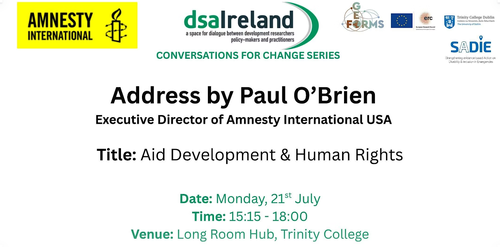Join us for light refreshments from 3.15pm, followed by an address by Paul O'Brien, Executive Director, Amnesty International USA, and a moderated discussion at Trinity Long Room Hub.
This event is co-organised in collaboration with Geoformations and SADIE of Trinity College.
This is the second in the series of Conversations organised by the Development Studies Association Ireland and Public Good, in collaboration with Geoformations and SADIE of Trinity College, designed to be a space to think openly, radically and long term.
In May 2024, The President raised big questions in his address to the Dóchas 50th anniversary conference. One of those challenges was to the academic community – to stop spending time on the micro and to address the structural and cultural issues. The other was to civil society – to be courageous and to use our anger and agency.
On 21st July 2025, we want to take this discussion forward. DSAI will host Paul O’Brien, Director of Amnesty USA, to talk about the destruction of the institutions and core consensus that allowed the humanitarian and development system to work. The conversation will be about what comes next, focusing our attention on how these issues can be built into public and political discourse, higher education and research so that Ireland might be proactive on propositions for future international cooperation and promotion of human rights.
This builds on last year’s DSAI’s Conversation for Change with Jonathan Glennie on the future of financing and global public goods. The conversation was about how the economic and social system – in Ireland as well as more widely - be transformed to properly value the things which the market systems itself fails to recognise, let alone value or deliver.
Title: Aid Development & Human Rights
The aid system is in existential crisis. With the collapse of USAID and the failure of the US development and political system to properly name and respond to the humanitarian crisis in Gaza and on its own border, amongst so many other crises, we are now witnessing the destruction of the institutions and core consensus that allowed the humanitarian and development system to save lives, mitigate economic and rights inequalities and meet core needs for decades.
What happens now and in the years to come? And how can a human rights approach provide any political and policy support for resurgent support for humanitarianism, when in the US and around the world, it too is under threat.
Paul O’Brien, Executive Director of Amnesty International USA, based in Washington DC will reflect on these questions and others. His bio is below.
Since April 2021, Paul O’Brien has been the Executive Director at Amnesty International USA, a human rights organization of 240,000 members and 125 staff. Over his career he has done human rights research and advocacy in more than 50 countries, including most recently Mexico, Israel, Gaza and the West Bank. He lived for 10 years in Africa working for local and international organizations, and for 5 years in Afghanistan.
Before Amnesty, Paul co-led Oxfam’s worldwide influencing network’s advocacy efforts during the Covid pandemic and led Oxfam America’s advocacy with the US government and corporations. He has been an advisor to the President of Afghanistan, the Africa Policy Advisor for CARE, and an organizer in Nairobi’s informal urban settlements. He was the President of the Echoing Green Foundation and a litigator in New York for Cravath, Swaine and Moore. He has a JD from Harvard Law School.
Before joining Amnesty, he published “Power Switch” How We Can Reverse Extreme Inequality.”
